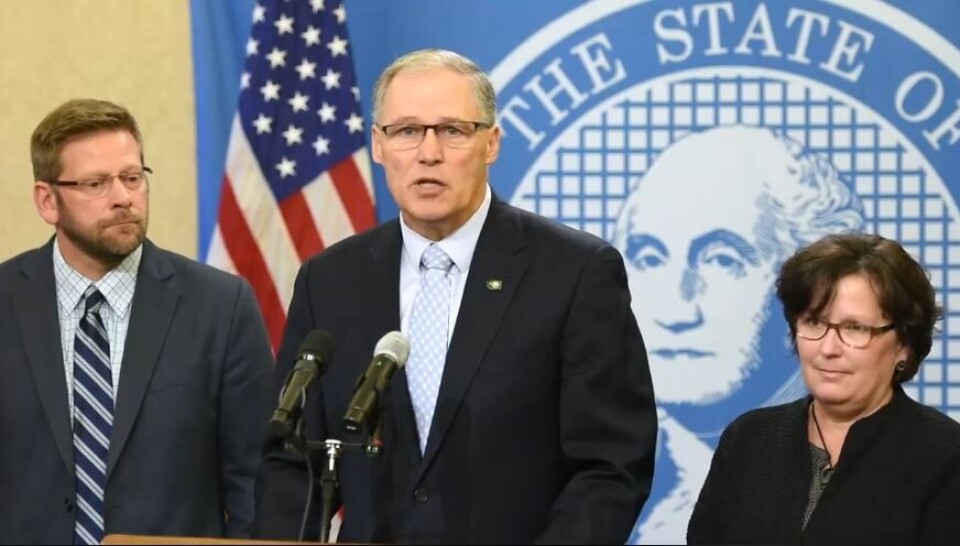
Cooke $76m court threat to 'anti-foreigner' ban bid
Cooke Aquaculture Pacific has urged state senators in the western US state of Washington to make laws based on sound science, and not "emotion and ideology", when they vote later this week on whether to approve a ban on the state’s existing salmon farming industry.
And Canadian-owned Cooke - which believes it has received unfair treatment because it is a non-US company - has warned that it will seek to recover its confiscated $76 million investment, plus costs and lost profits, through mandatory arbitration against Washington state under the North American Free Trade Agreement (NAFTA) if the senate bans salmon farming by voting House Bill 2957 into law on Thursday.

In a statement, Cooke said Washington’s salmon farms have operated in Puget Sound since the 1980s under an assortment of owners throughout the years, with the latest – prior to Cooke Aquaculture Pacific – being Icicle Seafoods. “With Icicle on the brink of bankruptcy in 2016, Cooke announced it would purchase all of Icicle’s farms and retain the entirety of its rural workforce,” said Cooke press spokesman Joel Richardson.
Revoked leases
Cooke has been under pressure from state agencies, in particular the Department of Natural Resources (DNR) and its Commissioner, Hilary Franz, since the collapse of a net-pen and escape of more than 100,000 Atlantic salmon at its Cypress Island farm in August. Franz ordered all of Cooke's farms at four locations to be inspected, and has revoked the leases for two of the four sites, Cypress Island and Port Angeles, on the grounds that they do not comply with lease conditions.
In its statement this week, Cooke pointed out that it obtained state regulatory approval needed to complete the purchase of Icicle, including approval by the DNR. It added that at no time during the purchase did any state agency or official express any concern about the acquisition or the possibility of salmon escapes, or suggest in any way that Icicle’s operations were out of compliance with any state laws, regulations or leases.
Widespread disparagement
In February 2017, with some of its acquired nets pens near the end of their useful life, Cooke applied for DNR permits to install new state-of-the-art pens, including at the Cypress facility, once the pens were emptied of stocked fish. Richardson said the company was not prepared for the subsequent widespread disparagement by public officials of Cooke as a company or salmon farming as an industry following the August collapse of its Cypress Island net pen structure.
“The criticism by members of the Legislature, the Governor and the Commissioner of Public Lands was and is surprising, as it both reflects and relies upon cherry-picked findings peddled by advocacy groups who misuse scientific literature to exaggerate the very low risk posed to native salmon,” said Richardson. “The state’s own Department of Fish & Wildlife has consistently reported that the escaped fish from Cypress Island carried no pathogens and are not able to survive in the wild or compete or interbreed with wild salmon. Although there have been plenty of fears expressed, there’s no scientific basis for claiming that Atlantic salmon threaten native salmon.”
Disproportional response
Richardson said the response of state lawmakers and other officials seeking to outlaw farmed Atlantic salmon in Washington waters is disproportional to the actual impact of the August incident, as well as being discriminatory against a foreign company.
"We note that the Legislature did not seek bans of US-based companies or industries in the past after pipeline explosions, refinery accidents, oil spills or floods of raw sewage. Unlike those accidents involving domestic companies or agencies, not one human was injured and not a single wild fish was killed by the accident occurring at the company’s Cypress facility."
No previous penalties
Richardson said the difference in how Cooke is being treated is legally significant: “In the more than 30 years that salmon has been farmed in Puget Sound, there have been other larger fish escapes from domestically-owned aquaculture facilities prior to Cypress. Not one of those incidents resulted in lease termination by DNR or even so much as a single penalty by the state, let alone an attempted ban by the Legislature. The only difference between then and now is ownership by Cooke, a foreign investor."
He continued: "There’s a trade agreement [NAFTA] that provides for relief in exactly this type of situation where a foreign company is treated worse than, and is disadvantaged against, its domestic counterparts." He concluded: "We respectfully request the Senate to postpone a vote on HB 2957 until it has had an opportunity to consider the possibility of being required to pay Cooke for the confiscation of its investment.”























































